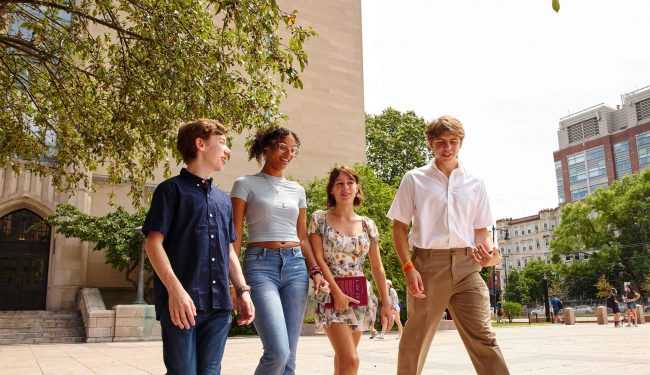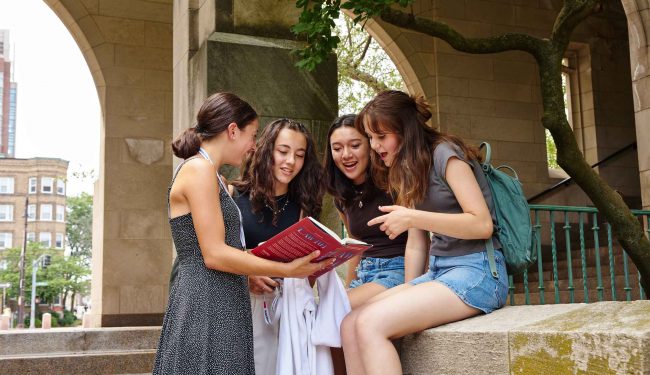Summer Challenge: Seminars
Note: All sessions in the Summer Challenge program are now full, and we are no longer accepting applications for summer 2024.
Boston University’s Summer Challenge seminars allow you to engage in a high level of learning and achievement with other high school students—without focusing on grades. Choosing two noncredit seminars (one morning, one afternoon), you’ll participate in lectures, discussions, individual and group work, project-based assignments, and field trips. Small class sizes ensure ample attention from experienced college instructors as you meet the challenges of college-level study. Each seminar culminates in a final class presentation.
Following the conclusion of your Summer Challenge session(s), a certificate of completion and letters of evaluation from both seminar instructors will be provided to you.
Morning Seminars
- Abnormal Psychology
- Business: From the Ground Up
- Chemistry of Medicine
- Computer Science
- Creative Writing
- Electrical Engineering
- Film and Literature
- International Politics
- Journalism
- Nutrition
- Visual Arts
Afternoon Seminars
- Abnormal Psychology
- Anatomy and Physiology
- Business: From the Ground Up
- Computer Science
- Criminal Justice
- Economics
- Infectious Diseases
- Law
- Mass Communication
- Persuasive Writing
- Philosophy
- Photography
Abnormal Psychology
Investigate the experience and expression of psychological disorders—what it means to be “abnormal” and its effect on people’s lives. Students are encouraged to think analytically and challenge their beliefs regarding abnormal behavior and personality. Through dynamic group exercises and discussions, students gain a working knowledge of psychological disorders and an appreciation for the challenges of experiencing mental illness.
Morning Seminar: Sessions 2 & 3
Afternoon Seminar: Sessions 1, 2, & 3
Anatomy and Physiology
Understand the structure and function of the human body through anatomical models, animations, and specimen dissections. Learn how body systems work both independently and together to support life. Special conditions and disorders will also be studied as perturbations of the normal anatomy and physiology of human body systems.
Afternoon Seminar: Sessions 2 & 3
Business: From the Ground Up
Explore fundamental business principles and how they are applied in today’s marketplace. Learn what a business plan is and the importance of developing one to effectively market and finance any new venture. Students work in groups to develop product ideas.
Morning Seminar: Sessions 1, 2, & 3
Afternoon Seminar: Sessions 2 & 3
Chemistry of Medicine
Gain an introduction to the science of medicinal chemistry through lecture and laboratory experiments, with a focus on the mechanisms of action of drugs and other biologically active compounds. Experiments focus on detection, isolation, and purification of these compounds from drugs and natural sources. You will also have the opportunity to synthesize the active ingredients of an over-the-counter painkiller. The laboratory portion of the course introduces students to important techniques and procedures commonly used in medicinal, organic, and biochemistry laboratories. This is an introductory-level seminar.
Morning Seminar: Sessions 1, 2, & 3
Computer Science
This seminar provides an overview of computer science concepts and teaches basic programming skills. Learn about algorithms, variables and expressions, input and output, if-else statements, for and while loops, functions and parameters, and simple data structures. The history of computer science, artificial intelligence, software engineering, computer networking, and computer-human interaction are covered. You will work in groups to code in two programming languages, Scratch and Java, and will choose one language to use for a final project.
Afternoon Seminar: Sessions 1, 2, & 3
Creative Writing
You will have the opportunity to study and write poetry, fiction, and screenplays, with the end goal of creating a varied, original writing portfolio. Together we will read and analyze both classic and contemporary literature, respond to diverse prompts, meet acclaimed authors, and rigorously workshop each other’s writing.
Morning Seminar: Sessions 1, 2, & 3
Criminal Justice
The seminar explores the role of corrections and the impact of incarceration in America. Through case studies, films, presentations, and discussions, consider topics such as correctional theory, mass incarceration, and strategies for successful rehabilitation of offenders.
Afternoon Seminar: Sessions 2 & 3
Economics
This seminar examines the principles of economic behavior of individuals and firms. Through class experiments, you will become familiar with the theory of consumer choice as well as the strategic behavior of individuals and firms. By the end of the seminar, you will be able to use game theory to create a model of strategic decision making and find the predicted outcome of a game.
Electrical Engineering
Learn engineering methods through topical challenges provided by the Smart Lighting Center. Investigate and experiment with tools and technologies used in the development of novel LED lighting, including its adaptation to applications such as visual light communication.
Morning Seminar: Sessions 2 & 3
Film and Literature
Topic for summer 2024: The Journey in Literature & Film. Through seminar discussions, close reading, and film screenings, this seminar offered by BU’s Core Curriculum engages with works by authors that emphasize narratives of the journey both externally (environmental) and internally (psychological). The seminar encourages close reading at a university level, self-reflection, and critical observation of the journey narrative. A creative project based on the readings and the films will conclude the two weeks.
Morning Seminar: Sessions 2 & 3
Infectious Diseases
The goal of this seminar is to give you a basic understanding of the causes, pathology, and cures of human infectious diseases by engaging in lectures and conducting experiments. Specific diseases such as influenza, SARS, AIDS, and cancer are used to illustrate the mechanisms of human disease. The laboratory component of this seminar functions as an introductory microbiology lab that allows you to study the morphological and physiological characteristics of microorganisms.
Afternoon Seminar: Sessions 1, 2, & 3
International Politics
This seminar analyzes in depth several United States foreign policy case studies by considering structural, politico-bureaucratic, and socioeconomic factors. Students work in groups and participate in class debates to better understand the intricacies of decision making in resolving international conflict situations.
Morning Seminar: Sessions 1, 2, & 3
Journalism
This seminar examines various aspects of journalism, from print and newsreels to television and the internet, and culminates with the presentation of an original reporting project. Through lectures and practical exercises, you will learn concepts such as objective versus subjective reporting, features, reviews, ethics, and commentary. Class time is spent learning the histories of print and electronic media, studying the differences between the two formats, and presenting your work.
Morning Seminar: Sessions 1, 2, & 3
Law
Receive an introduction to the United States court system. Learn to read, interpret, and brief a court opinion as well as discuss the importance and effect of precedent under the common law. You will have the opportunity to sample the law school experience, gain fluency in legal vocabulary and procedures, and engage in mock adjudication sessions.
Afternoon Seminar: Sessions 1, 2, & 3
Mass Communication
Learn about advertising, public relations, journalism, film, and television. Classes focus on the history, current trends, and future of these media in America. You will work in groups on communication-related projects such as the advertising pitch, film analysis, news reporting, and television and print advertising.
Nutrition
Learn how to translate the latest nutrition guidelines into appealing food choices for health promotion and disease prevention. Explore nutrition basics including carbohydrate, protein, fat, calories, vitamins, and minerals, as well as nutrition preferences such as vegetarianism. You will calculate unique nutrition needs for individualized meal planning and develop skills and strategies to implement a healthy lifestyle through interactive sessions.
Morning Seminar: Sessions 1, 2, & 3
Persuasive Writing
Learn persuasive methods for expressing your ideas. Write convincing essays with an emphasis on research techniques, including the location, evaluation, and synthesis of secondary sources. Explore the special impact of evidence on persuasion as you develop core skills—analysis, argumentation, and sources used for academic writing.
Afternoon Seminar: Session 2
Philosophy
Topic for summer 2024: Great Debates. During our two weeks together, we will confront some of the great debates in the history of philosophy. We will address such questions as: Do we know anything? Is there free will? What makes us morally responsible for our choices? Does life have any meaning? Is it possible for a computer to become capable of human-like consciousness? Through engaging in great debates, we will hope to understand something about the nature of philosophy, including why and how we should go about doing it.
Afternoon Seminar: Sessions 2 & 3
Photography
You will learn the technical and aesthetic possibilities available when working in digital photography. Through a series of sequential assignments, you will explore the “digital darkroom” using digital imaging software and then output a portfolio of printed images. This course introduces the basic tools, techniques, and concepts of photographic media. Emphasis is placed on composition, narrative, and use of natural light. Each student must be equipped with a digital SLR camera with manual features.
Afternoon Seminar: Sessions 2 & 3
Visual Arts
Through drawing and painting, this seminar offers you an opportunity to work from observation and memory while exploring the use of representation, color, and abstraction to capture feeling and meaning. On-site drawing experiences at locations around the city such as a visit to the Museum of Fine Arts provide inspiration for students. No previous experience required.
Morning Seminar: Sessions 2 & 3



